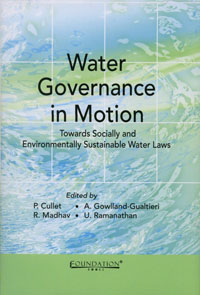Wastewater
Aquatech India 2011, Amsterdam RAI, Mumbai
Posted on 21 Dec, 2010 03:48 PMOrganizer: Amsterdam RAI
Venue: Bombay Exhibition Centre in Mumbai, India
Description:
Aquatech India 2011 exhibition and conference will showcase a wide spectrum of latest technologies and developments in the field of water and wastewater management. This tradeshow will provide manufacturers and suppliers a secure, recognized and reliable means/approach to enter the water industry.
Mining - An increasing threat to our rivers - Article by Nitya Jacob
Posted on 20 Dec, 2010 12:29 AMContent Courtesy: Solution Exchange and Nitya Jacob
Author: Nitya Jacob
India’s arteries are choking. Her rivers, the lifeline of hundreds of millions, are over-taxed, polluted and encroached. They are being mined, dammed and emptied of water. Save for the four monsoon months, most rivers are streams of drains, depending on how many cities they pass through. This year people gaped in awe at the River Yamuna (I am sure they were over-awed by other rivers elsewhere too) as for the first time since 1978 looked like a river and not a drain.
Mine the gap: Connecting water risks and disclosure in the mining sector – A report by the World Resources Institute
Posted on 17 Dec, 2010 10:43 PMThis paper by the World Resources Institute outlines potential water-related risks facing the mining industry and highlights important gaps in water-related disclosure. The purpose is to provide information, questions, and tools to help the financial community better evaluate water-related risks facing mining companies.
Water management across space and time in India – A working paper by the University of Bonn
Posted on 17 Dec, 2010 10:09 PMThis working paper by the University of Bonn attempts to give a spatial and temporal overview of water management in India. It traces how people and the successive regimes made choices across space and time from a wide range of water control and distribution technologies. The paper divides the water management in India into four periods –
- the traditional system of water management before colonial times;
- response from the colonial rulers to manage the complex socio-ecological system;
- large scale surface water development after independence; and
- finally, the small-scale community and market-led revolution.
The wealth of waste: The economics of wastewater use in agriculture - A report by FAO
Posted on 17 Dec, 2010 07:36 PM This report by the Food and Agriculture Organisation (FAO) deals with the economics of wastewater use in agriculture. It presents an economic framework for the assessment of the use of reclaimed water in agriculture, as part of a comprehensive planning process in water resource allocation strategies to provide for a more economically efficient and sustainable water utilization.
This report by the Food and Agriculture Organisation (FAO) deals with the economics of wastewater use in agriculture. It presents an economic framework for the assessment of the use of reclaimed water in agriculture, as part of a comprehensive planning process in water resource allocation strategies to provide for a more economically efficient and sustainable water utilization.
Water footprint assessments of dehydrated onion products of Jain Irrigation Systems Ltd – A report by IFC
Posted on 17 Dec, 2010 07:05 PMThis work on water footprint assessments represents a pioneering effort on documenting the water consumption in Jain Irrigation Systems Limited’s (JISL) production of dehydrated onions and of micro-irrigation systems. It also assesses the sustainability of this water consumption and formulate response strategies.
e-Disha November 2010 newsletter from Consortium for DEWATS Dissemination Society (CDD)
Posted on 29 Nov, 2010 10:59 AMArticle and Image Courtesy: Consortium for DEWATS Dissemination Society

The November edition of e-Disha published by the Consortium of DEWATS Dissemination Society (CDD) has the following highlights:
Compliance and monitoring of centralised wastewater treatment plants and the role of decentralised wastewater management, CSE, New Delhi
Posted on 23 Nov, 2010 04:22 PMOrganizer: Centre for Science and Environment (CSE)
Training program on 'Decentralised Wastewater Treatment and Reuse' , CSE, New Delhi
Posted on 23 Nov, 2010 03:00 PMOrganizer: Centre for Science and Environment (CSE)
Water governance in motion: Towards socially and environmentally sustainable water laws
Posted on 18 Nov, 2010 10:48 AM

Water Governance in Motion: Towards Socially and Environmentally Sustainable Water Laws focuses on the work undertaken by International Environmental Law Research Centre IELRC on water law reforms in India. It seeks to provide a broader understanding of the conceptual framework informing existing water law and ongoing reforms.





